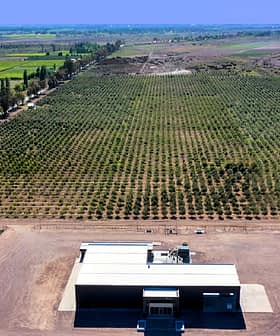Poor Olive Harvests in Europe Lead to Boom in Exports From Mendoza
Olive oil sales in Mendoza doubled this year, mostly to Brazil, Canada, Chile, the United States, Mexico and Spain.
 Olivicola Simone
Olivicola SimoneOlive oil exports have quadrupled in the past five years in the Argentinian province of Mendoza, according to government statistics.
The increase in exports in 2017 was, in part, due to the low harvest in 2016 in Spain of fruit destined for the production of olive oil.
Producers in the western province exported nearly 10,000 tons of bulk and individually packaged olive oil last year, up from nearly 5,000 tons in 2016.
The main destinations for the olive oil were Brazil, Canada, Chile, the United States, Mexico and Spain. Olive oil producers in the region attribute the increase in exports to bad years for producers in the European Union and a rising demand in Brazil and the United States for olive oil.
“The increase in exports in 2017 was, in part, due to the low harvest in 2016 in Spain of fruit destined for the production of olive oil,” José Luis Simone, the head of Olivicola Simone, said.
Olivicola Simone is an oil producer based in Mendoza. Simone said that an increased demand for canned olive oil and a growing appetite for extra virgin olive oil in California also factored into the increase in exports.
“Here in Argentina, we export plenty of canned oil to Brazil… They are big consumers of canned goods and [we sold more oil] than usual last year,” he said. “In addition, one company in California also imported a lot from us.”
According to ProMendoza, an organization that promotes exports from small and medium-sized businesses, olive oil sales increased by more than 100 percent from 2016 to 2017.
Ana Stoddart, a business intelligence analyst at ProMendoza, said that olive oil exports to Spain and the United States drastically rebounded from last year and made up a majority of the region’s increase in exports.
© Olive Oil Times | Data source: International Olive Council
“The national exports of olive oil [to Spain and the US] have grown at rates above 100 percent,” she said.
The exported oil has increased in quality as well. Last year’s exports were worth approximately $3,900 per ton compared with the $3,400 per ton in 2016.
“In terms of quality, Mendoza produced oil that falls well within the International Olive Council regulations,” Simone said. “Our very high oil quality standards are especially appreciated by the North American market.”
Stoddart attributed the augmented exports to the increasing standard of the oil’s sensorial qualities, which is sought after by olive oil consumers.
“The organoleptic properties of oils is exceptional with very good public acceptance,” she said. “The outlook for the sector is positive.”
This optimism for the future is widespread in the province. Simone sees the growing demand for higher quality extra virgin olive oil in North America as very favorable for Mendoza, provided producers can keep up.
“As more and more extra virgin olive oil is consumed, it will cause a more aggressive demand for fruit from the oil industry in the future,” he said.
However, Nicolás Piazza, the head of international negotiations at ProMendoza, warned that future demand will not solely be dictated by oil quality.
“When these variations in exports occur, it is due, in part, to the harvests, but also has to do with the performance of the international markets,” he said.
Piazza believes that producers in Mendoza must concentrate on South American markets, such as Chile and Brazil in order to maintain their forward momentum.
“In 2018 we will focus on continuing to position Mendoza in large Brazilian markets and encourage sub-exploited regional markets,” he said.








